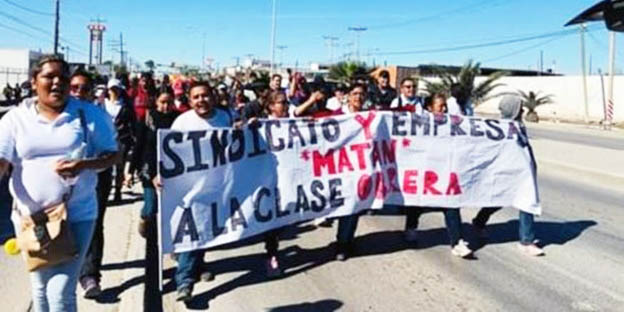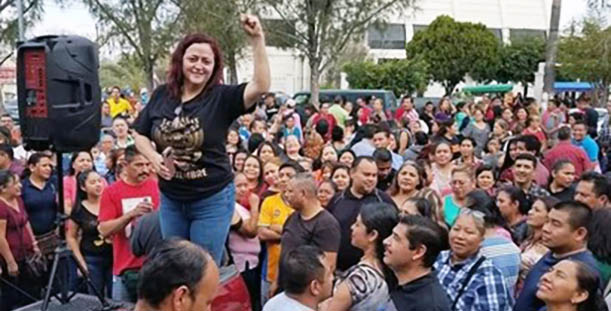|
|
|
|
The weekly newsletter of the México Solidarity Project |
|
|
|
June 2, 2021/ This week's issue/ Meizhu Lui, for the editorial team |
|
|
Mexican Workers, the Devil, and the Deep Blue Sea |
|
Sometimes you’re caught, as the saying goes, “between the devil and the deep blue sea.” Whichever way you turn, you know things aren’t going to end well. Maquila workers in México face that exact situation. As the sign declares in this photo of striking workers in Matamoros: “The union and the company are killing the working class.”
Unions, of course, aren’t supposed to be killing the working class. Unions stand classically as the worker voice and fist. They ensure that workers don’t have to put up or shut up. But most Mexican unions belong to the Confederation of Mexican Workers. These CTM unions work hand in glove with employers. They look the other way when managements violate labor laws. They sign pro-company contracts that workers never get to see, let alone ratify. They even use thuggery against anyone who objects to the cozy partnership between union and company bosses. They make “killing” much more than a metaphor.
The companies involved here have increasingly become foreign-owned operations. The NAFTA trade deal went into effect in the 1990s. Back then, México hosted only about 2,000 maquiladora factories. The count today: about 5,000. Foreign companies haven’t rushed into México to improve the lives of Mexican workers. They’ve rushed in to exploit Mexican workers, and they’ve succeeded at that. Wages are now running lower in México than in China, the reason why Chinese companies are also rushing to move production to México.
The maquiladoras, simply put, have the power to make their own rules. One example: The AMLO administration has substantially increased México’s minimum wage. The maquilas have just not bothered to comply. But in Matamoros — and beyond — workers have had enough. They had learned to distrust both companies and unions. But now they stand ready to put their lives on the line to create a new kind of union, one they themselves control.
And these workers also see themselves, in the national mid-term elections next week, no longer trapped between two anti-worker parties, the PRI and the PAN. As the fearless labor lawyer and independent union organizer Susana Prieto Terrazas puts it, only democracy — meaning real worker participation — can break workers free from the companies, unions, and political parties that have been “killing the working class.”
We have more this week on the struggle for labor rights in México — and next week’s contentious and critically important midterm Mexican elections. |
|
|
The trade deal now in effect between México and the United States — the revised NAFTA, or USMCA as the new acronym goes — has two mechanisms that give Mexican workers, at least on paper, a better shot at breaking free of corrupt “protection” unions. Under the deal’s “rapid response” provision, individual companies can be charged with violating the treaty. The “state to state” process lets one signatory country ask another to investigate alleged labor rights violations. Activists, notes Public Citizen’s Global Trade Watch founder and director Lori Wallach, are now putting both these mechanisms to the test. Wallach recently hosted a discussion on the revised NAFTA with leading activists in the fight for labor rights. We have highlights here. |
|
|
Lori Wallach: On May 10, the first USMCA “rapid response” complaint was filed against Tridonex, an auto parts company, by the AFL-CIO, SEIU, SNITIS — the independent maquila workers union — and Public Citizen. Ben Davis, international director of the United Steelworkers, you played a leading role. Can you explain?
Davis: This case comes out of a massive uprising in 2019 by the Tridonex workers in Matamoros on the Texas border, in the state of Tamaulipas, an uprising fired up by Susana Prieto and her idea of an independent union. AMLO had more than doubled the minimum wage in México, but workers at Tridonex, a firm with US and Canadian parent companies, were not getting the raise. They won the raise — but not independent union representation.
Under the USMCA, the Tridonex workers have the right to choose their union. We filed with the US Trade Representative Katherine Tai. The USTR filed its own case against a GM plant in the state of Guanajuato for ballot tampering. Everyone in México is watching these cases, which test the AMLO administration’s support for labor rights.
LW: Susana Prieto Terrazas, because you were organizing an independent maquila union, SNITIS, you suffered arrest and detention. What happened?
Prieto Terrazas: In México, the unions in the Federation of Mexican Labor have always been an arm of the former PRI government, and the PRI assigned the CTM the job of keeping wages from rising and protecting both Mexican and foreign companies from worker unrest. Human Resources departments tell workers: either join the CTM or you’ll be fired.
I was helping workers learn and demand their rights. That made me an enemy to Mexican and US business. I was accused of being Donald Trump’s agent, sent to destabilize the Mexican government. Others said that AMLO sent me to Matamoros to destabilize the government of the state of Tamaulipas! My arrest was purely political, to stop me from organizing. At least I’m out of jail now, but I’m still not free to travel beyond the state of Chihuahua.
The Morena government needs to recognize that it can’t afford to leave labor rights in Matamoros in the hands of the rightist governor of Tamaulipas. We need to take away the power of corrupt governors and their arbitration boards. Chapter 23 of the USMCA looks like the best tool we have for accomplishing that, so we must try to use it.
LW: Our Global Trade Watch research director Daniel Rangel has a new report out on the implementation of the USMCA and the new Mexican labor laws. What were your key findings — and recommendations?
Rangel: México’s northern states, where the vast majority of maquilas are located and we see the most labor strife, won’t get the newly mandated federal courts until 2022, under the current schedule. If a labor complaint comes in a state with no federal court, the workers must use the old corrupt system that’s stacked against them. The states with the most problems must be moved to the front of the line for federal attention. |
|
|
Matamoros workers with labor attorney and union organizer Susana Prieto Terrazas |
|
|
Next week’s Mexican midterm elections have, by and large, drawn predictable coverage in the US media. Most outlets have echoed the complaints of México’s corrupt traditional parties and painted President Andrés Manuel López Obrador — who won’t be on the June 6 ballot — as some sort of would-be strongman of dubious democratic inclinations. But some press reports have gone beyond the media’s typical knee-jerk, anti-progressive perspective and presented a more nuanced view of the upcoming Mexican balloting for state and national lawmakers and executive officials. One example: this excerpt from a Los Angeles Times pre-election analysis by Kate Linthicum that appeared earlier this week. |
|
‘AMLO wants to transform Mexico’ |
|
AMLO’s critics have struggled to find political footing.
López Obrador won the presidency in a landslide in his third try, in 2018, fueled by widespread anger at earlier leaders who failed to quell flagrant corruption, rising violence and entrenched economic inequality.
In this election cycle, the country’s three traditional political parties have put aside their long-standing rivalries and ideological conflicts to form a coalition to oppose Morena. But polls show the opposition coalition gaining only about a quarter of the seats in the lower house of Congress.
Much of that is thanks to López Obrador’s uncanny ability to shape popular opinion. Every morning he speaks to the nation for two to three hours on a live broadcast from the National Palace. An amateur historian, he talks at length about how Mexico’s free-market reforms beginning in the 1980s benefited the rich and left the poor behind.
And yet his policies have failed to put a dent in poverty, which last year increased from 36 percent of the population to 45 percent, according to the national social development agency Coneval, a rise fueled by the pandemic. Violence, too, continues unabated, with about 80 candidates and politicians killed in this election cycle alone, a testament to the close links between many local governments and organized crime.
Even though polls show that Mexicans are worried about the economy, the pandemic and crime, AMLO receives high marks for “closeness to the people,” said pollster Javier Marquez. “People still think that this president understands them and their needs more than anybody else,” he said.
It is unclear whether that will translate to support for Morena. While López Obrador has carefully crafted his own image, he has been less disciplined when it comes to developing Morena into a strong political party that stands for anything more than support for AMLO.
...Carlos Bravo Regidor, a professor at CIDE, a public research center in Mexico City, said López Obrador’s lack of interest in building up the party shouldn’t come as a surprise.
“Precisely because he’s a charismatic leader who wants to have a direct link with people, he’s allergic to institutions that would mediate that relationship,” he said. |
|
|
Recent news reports and commentaries, from progressive and mainstream media,
Sondeo de Citibanamex: Morena retiene San Lázaro y popularidad de AMLO en 65%. La PolíticaOnline. Tras su sondeo concluye que la coalición PAN-PRI-PRD no es suficientemente competitiva para arrebatarle el control.
‘Unethical liars:’ AMLO replies to hard-hitting editorial in British newspaper, México News Daily. The Mexican president deems critique by the Economist as “very propagandistic.”
John Ackerman, Enterrar al neoliberalismo en las urnas, La Jornada. El renovado ataque de la prensa financiera internacional en contra del gobierno de AMLO en la víspera de las elecciones nos recuerda que el gobierno actual es uno de los principales opositores a la hegemonía política global de las empresas transnacionales y el capital financiero.
In Mexico, campaigners fear attacks that have killed 34, KSAT. Some 34 formal or would-be candidates who already have been killed in the run-up to Mexico’s June 6 midterm elections. Experts say drug cartels often attack innocent candidates to force them out of races and leave the way clear for cartel favorites.
AMLO anuncia la compra de una refinería en Texas, El Financiero. El presidente anunció la compra de la refinería Deer Park en Houston, Texas, propiedad de Shell.
Dora Villanueva, México, país más beneficiado del crecimiento de EU, La Jornada. El 97 por ciento de las exportaciones mexicanas entran al mercado estadunidense bajo el acuerdo de libre comercio y la inversión extranjera de Estados Unidos en México es equivalente a la hecha en conjunto para Argentina, Brasil y Colombia. |
|
|
The Mexico Solidarity Project brings together activists from various socialist and left organizations and individuals committed to worker and global justice who see the 2018 election of Andrés Manuel López Obrador as president of México as a watershed moment. AMLO and his progressive Morena party aim to end generations of corruption, impoverishment, and subservience to US interests. Our Project supports not just Morena, but all Mexicans struggling for basic rights, and opposes US efforts to undermine organizing and México’s national sovereignty.
Editorial committee: Meizhu Lui, Bruce Hobson, Bill Gallegos, Sam Pizzigati. We welcome your suggestions and feedback. Interested in getting involved? Drop us an email! |
|
|
|
Web page and application support for the México Solidarity Project from NOVA Web Development, a democratically run, worker-owned and operated cooperative focused on developing free software tools for progressive organizations. |







